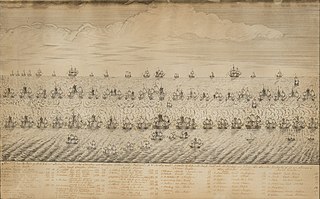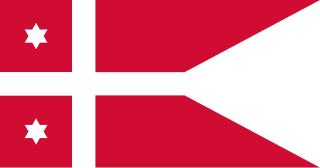List of vice admirals
1600
| Portrait | Name (birth–death) | Appointed | Ref. |
|---|---|---|---|
 | Jørgen Biørnsen (1596–1680) | 1 May 1651 | [1] |
 | Nicolaj Helt (?–1667) | 1656 | [2] |
 | Peter Bredal (c. 1630–1658) | 20 July 1658 | [3] |
 | Iver Hoppe (1649–1693) | 1 July 1684 | [4] |
 | Cornelius de Witt (?–?) | 7 October 1684 | [5] |
1700
| Portrait | Name (birth–death) | Appointed | Ref. |
|---|---|---|---|
 | Just Juel (1664–1715) | 5 March 1712 | [6] |
 | Christian Carl Gabel (1679–1748) | 15 May 1715 | [7] |
 | Peter Wessel Tordenskiold (1690–1720) | 17 August 1719 | [8] |
 | Johan Anthon von Paulsen (1687–1736) | 10 November 1727 | [9] |
 | Christian Koningh (1677–1749) | 26 September 1736 | [10] |
 | Rasmus Krag (1680–1755) | 26 September 1736 | [11] |
 | Hans Jacob Rostgaard (1685–1756) | 28 October 1746 | [12] |
 | Vilhelm Lemvig (1690–1768) | 4 September 1747 (À la suite) | [13] |
 | Caspar von Wessel (1693–1768) | 4 September 1747 (À la suite) | [14] |
 | Johan Conrad Wodroff (1690–1747) | 4 September 1747 | [15] |
 | Michael Christian Tønder (1692–1755) | 11 October 1752 | [16] |
 | Olfert Fasvier Fischer (1700–1761) | 7 September 1758 | [17] |
 | Christian Carl von Basballe (1732–1783) | 29 May 1765 | [18] |
 | Jørgen Torbiørnsen (1698–1771) | 22 July 1769 | [19] |
 | Friderich Zimmer (1702–1774) | 30 September 1772 | [20] |
 | Johan Cornelius Krieger (1725–1797) | 31 July 1790 | [21] |
 | Ole Stephansen (1714–1791) | 24 September 1790 | [22] |
 | Andreas Lous (1728–1797) | 23 December 1796 (À la suite) | [23] |
 | Adam Gottlob Ferdinand Moltke (1748–1820) | 22 December 1797 (À la suite) | [24] |
1800
| Portrait | Name (birth–death) | Appointed | Ref. |
|---|---|---|---|
 | William Walker Stockfleth (1737–1818) | 6 April 1804 | [25] |
 | Anton Frederik Lützow (1744–1819) | 28 January 1817 | [26] |
 | Jens Schou Fabricius (1758–1841) | 23 August 1821 | [27] |
 | Olfert Fischer (1747–1829) | 4 January 1825 | [28] |
 | Adolph Tobias Herbst (1746–1825) | 4 January 1825 | [29] |
 | Jost van Dockum (1753–1834) | 16 April 1833 | [30] |
 | Peter Caspar Wessel Brown (1755–1840) | 20 July 1834 (À la suite) | [31] |
 | Frederik Christian Riisbrigh (1754–1835) | 1 August 1834 (À la suite) | [32] |
 | Johan Johnsen (1765–1847) | 25 December 1835 | [33] |
 | Hans Stephensen (1773–1851) | 29 March 1848 | [34] |
 | Jens Peter Stibolt (1774–1860) | 19 October 1848 (À la suite) | [35] |
 | Andreas Schifter (1779–1852) | 3 August 1851 | [36] |
 | Christian Christopher Zahrtmann (1793–1853) | 2 April 1852 | [37] |
 | Conrad Emil Mourier (1795–1865) | 1 April 1853 | [38] |
 | Johan Anton Meyer (1799–1875) | 28 February 1860 | [39] |
 | Jens Seidelin (1790–1863) | 30 March 1863 (À la suite) | [40] |
 | Steen Andersen Bille (1797–1883) | 18 January 1864 | [41] |
 | Edouard Suenson (1805–1887) | 5 August 1880 (À la suite) | [42] |
 | Carl Irminger (1802–1888) | 5 August 1880 (À la suite) | [43] |
 | Julius Meldal (1827–1901) | 21 February 1886 | [44] |
 | Niels Frederik Ravn (1826–1910) | 8 July 1891 (À la suite) | [45] |
 | Hans Henrik Koch (1836–1903) | 19 July 1897 | [46] |
 | Fritz Peter Adolph Uldall (1835–1911) | 2 January 1899 | [47] |
1900
| Portrait | Name (birth–death) | Appointed | Ref. |
|---|---|---|---|
 | Carl Frederik Wandel (1843–1930) | 9 March 1905 | [48] |
 | Otto Joachim Moltke Kofoed-Hansen (1854–1918) | 1 October 1911 | [49] |
 | Anton Ferdinand Mazanti Evers (1857–1951) | 27 April 1918 | [50] |
 | Georg Hugh Robert Zachariae (1850–1937) | 5 October 1918 (À la suite) | [51] |
 | Henri Konow (1862–1939) | 1 April 1923 | [52] |
 | Georg Carl Amdrup (1866–1947) | 7 February 1927 | [53] |
 | Henri L. E. Wenck (1872–1933) | 1 December 1931 | [54] |
 | Hjalmar Rechnitzer (1872–1953) | 1 April 1932 | [55] [56] |
 | A. H. Vedel (1894–1981) | 1 August 1941 | [57] |
 | Hans Alfred Nyholm (1898–1964) | 1 June 1958 | [58] |
 | Svend Erik Pontoppidan (1900–1987) | 1 June 1961 | [59] |
 | Sven Støckel Thostrup (1915–2006) | 1 December 1965 | [60] |










